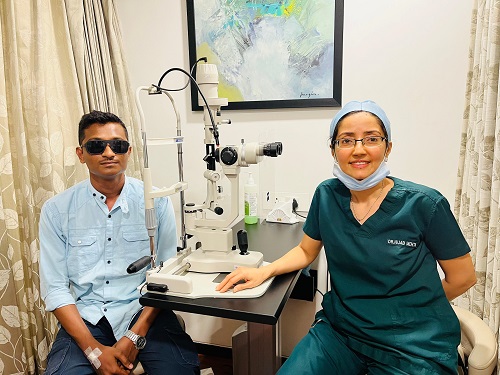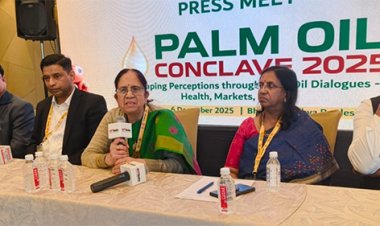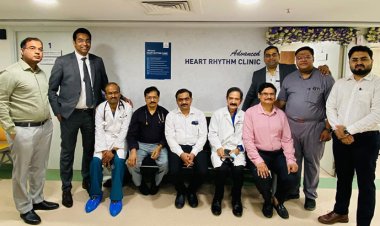Clear Vision Restored in Youth Suffering from Rare Eye Disorder with Bulging, Conical-shaped Cornea
Tushar Salunke, a 27-year-old HR professional hailing from Palghar, found himself facing an unexpected challenge when diagnosed with keratoconus, a rare eye disorder that causes the cornea to progressively thin and bulge into a cone shape. Conventional treatment options provided little promise for improved vision. Advanced cases may require a cornea transplant.

Tushar Salunke, a 27-year-old HR professional hailing from Palghar, found himself facing an unexpected challenge when diagnosed with keratoconus, a rare eye disorder that causes the cornea to progressively thin and bulge into a cone shape. Conventional treatment options provided little promise for improved vision. Advanced cases may require a cornea transplant. However, a glimmer of hope emerged when Tushar sought the expertise of Dr. Hijab Mehta, Joint Chief of Clinical Services, at Infiniti Eye Hospital, a unit of Dr. Agarwals Eye Hospital located at Tardeo, Mumbai.
Patient Tushar Salunke with Dr. Hijab Mehta, Joint Chief of Clinical Services, at Infiniti Eye Hospital, a unit of Dr. Agarwals Eye Hospital located at Tardeo, Mumbai
Keratoconus, characterized by the cornea adopting a conical shape, often leads to compromised vision. Tushar was told by doctors that his best-case scenario involved life-long reliance on specialized contact lenses, as traditional eyeglasses will not be able to offer the clarity of vision that he needed. The gradual progression of the condition over the years would require Tushar to make frequent trips to Mumbai to seek treatment and newer, more powerful contact lenses.
After carefully examining the patient's eye condition, Dr. Hijab Mehta decided to conduct the CAIRS (Corneal Allogenic Intrastromal Ring Segments) procedure, an innovative approach with the potential to enhance vision in keratoconus patients. Following thorough consultations and specialized tests, the patient successfully underwent CAIRS surgery successfully.
Talking about the significance of the CAIRS procedure, Dr. Hijab Mehta, Joint Chief of Clinical Services, Infiniti Eye Hospital, Mumbai, said, "For years, our treatment options for keratoconus patients were confined to slowing down the progression of the condition. With the advent of CAIRS, we can now offer an efficient and safe solution that not only halts the progression but also significantly improves the vision for keratoconus patients. This innovative technology offers a ray of hope for thousands of patients of keratoconus who previously accepted living their whole life with compromised vision as their fate."
She added, "Diverging from traditional treatments, CAIRS leverages cutting-edge technology, including femtosecond lasers, to create micro-tunnels within the cornea. These tunnels are fortified with donor corneal tissue, acting as a supportive splint to counteract the conditions effects. This surgical process eliminates the need for stitches, injections, or eye patches, streamlining the recovery journey."
Tushar Salunke, said, "I want to extend my heartfelt thanks to the incredible doctors at Infiniti Eye Hospital and specially Dr. Hijab Mehta for restoring my vision. Their skill and care have given me a new lease on life, allowing me to rediscover the beauty in the world around me. I am truly grateful for their expertise and dedication."
Post-procedure, Tushar experienced swift improvement in his vision, leading to rapid recovery that enabled him to resume work within just 10 days. He has not only regained full functionality in his professional life, he also now envisions a future which does not entail a lifelong reliance on specialized keratoconus contact lenses.
The patient's success story stands as a testament to the capacity of advanced techniques to reshape lives and infuse renewed hope into those affected by rare eye conditions.
![]()






















